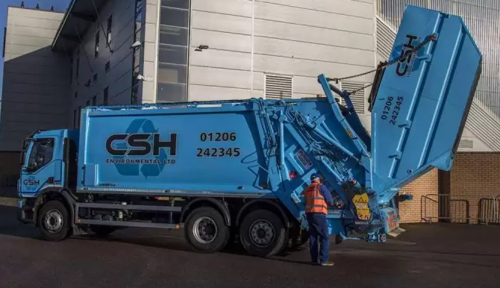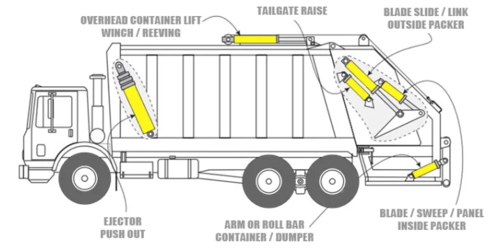REL Lorry: Difference between revisions
No edit summary |
|||
| (4 intermediate revisions by 2 users not shown) | |||
| Line 8: | Line 8: | ||
==Process== | ==Process== | ||
The skip has | The skip has 'pins' at the front on either side which dock onto the rear of the lorry for the skip to pivot against. Chains, which are attached to the arm of the lorry, are manually attached to the skip via 'lugs' which are fixed on the rear of the skip. When the arm is engaged and moves towards the body of the lorry, the bin pivots on the rear of the lorry as the rear lifts into the air, and empties its contents into the rear of lorry. The point of waste deposit into the lorry is called a hopper, and within this unit there is a hydraulic ram that pushes the waste into the body of the lorry via a blade through a series of compacting cycles (see diagram below). This compaction allows multiple skips of compressible [[waste]] (such as [[Cardboard]] and/or [[Residual Waste]]) to be emptied and compacted into the lorry to optimise the weight and the logistics associated with onward transportation for processing. At the point of unloading, the rear section of the lorry, including the compacting hopper unit, opens upwards at the rear of the lorry, and a separate hydraulic ram is then used to push the collected waste out of the vehicle. | ||
[[ | The pictures and footage below show and REL Lorry lifting an [[REL Skip]], but for more detail on the way an [[REL Lorry]] operates see the [[RCV]] page on WikiWaste. | ||
{| class="wikitable" | |||
|- | |||
|[[File:Screenshot 2022-07-26 191746.png|500px|left|Rear Loader Refuse Truck and Hydraulics Layout, all rights reserved Wastebuilt and Eagle Hydraulics]] ||{{#ev:youtube|v=--EJ3yJ73nA|450|inline| | |start=38&end=168}} | |||
|- | |||
|'''Cross Section Example of RCV Showing Hydraulic Rams'''||'''Video Footage of REL by [[Biffa]]''' | |||
|} | |||
Latest revision as of 15:06, 2 August 2022
An REL Lorry or Rear End Loader Lorry is a type of lorry used to empty an REL Skip at a waste producers' premises without the removal of the REL Skip from the site. The lorry uses chains attached to a lifting arm at the rear of the lorry that locate either side of the REL Skip for loading into the lorry (hence the term 'rear end loader'). The lifting arm and chains are folded away during road use.

Summary
An REL Lorry or Rear End Loader Lorry is a type of lorry used to empty an REL Skip at a waste producers' premises without the removal of the REL Skip from the site. The lorry uses chains attached to a lifting arm at the rear of the lorry that locate either side of the REL Skip for loading into the lorry (hence the term 'rear end loader'). The lifting arm and chains are folded away during road use.
Process
The skip has 'pins' at the front on either side which dock onto the rear of the lorry for the skip to pivot against. Chains, which are attached to the arm of the lorry, are manually attached to the skip via 'lugs' which are fixed on the rear of the skip. When the arm is engaged and moves towards the body of the lorry, the bin pivots on the rear of the lorry as the rear lifts into the air, and empties its contents into the rear of lorry. The point of waste deposit into the lorry is called a hopper, and within this unit there is a hydraulic ram that pushes the waste into the body of the lorry via a blade through a series of compacting cycles (see diagram below). This compaction allows multiple skips of compressible waste (such as Cardboard and/or Residual Waste) to be emptied and compacted into the lorry to optimise the weight and the logistics associated with onward transportation for processing. At the point of unloading, the rear section of the lorry, including the compacting hopper unit, opens upwards at the rear of the lorry, and a separate hydraulic ram is then used to push the collected waste out of the vehicle.
The pictures and footage below show and REL Lorry lifting an REL Skip, but for more detail on the way an REL Lorry operates see the RCV page on WikiWaste.
 |
v=--EJ3yJ73nA|450|inline| | |start=38&end=168}} |
| Cross Section Example of RCV Showing Hydraulic Rams | Video Footage of REL by Biffa |
